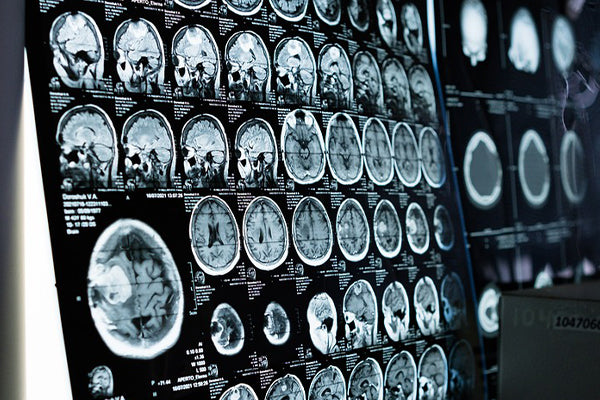Brain Tumour Causes

What causes a brain tumour?
No single, definitive cause has yet been identified for primary brain tumours - tumours that originate in the brain rather than metastasising from another form of cancer such as breast, lung or melanoma.
Some risk factors have been identified, but due to the complex and unique health history for each patient, scientists are still unable to answer this fundamental question of why a brain tumour has appeared. Like all tumours and cancers, mutations in the DNA of a cell leads to abnormal growth (uncontrolled division), but what causes these mutations is likely to vary between individuals.
We've collated extensive information in order to bring you the latest thinking on what environmental and lifestyle risks might be increasing the risk of being diagnosed with a brain tumour. We will be updating this page regularly so please do keep coming back for the latest information.
Can radiation cause a brain tumour?
The most well known environmental risk factor for the development of brain tumours is exposure to radiation, especially where this has been used for previous cancer treatment in the same site.
Does the risk of getting a brain tumour increase with age?
As humans age, there is a higher the risk of developing a wide range of health conditions, including certain brain tumours. For example, glioblastoma multiforme (GBM) brain tumour is most common amongst 75 to 84-year-olds.
Can the risk of a brain tumour be inherited?
There is evidence that, in a very small number of cases, inherited genetic factors or conditions have contributed to the development of a brain tumour. These conditions include Li-Fraumeni syndrome, neurofibromatosis, nevoid basal cell carcinoma syndrome, tuberous sclerosis, Turcot syndrome, and von Hippel-Lindau disease.
Scientists have also found “clusters” of brain tumours within some families without a link to these known hereditary conditions. Studies are underway to try to understand more.

Do mobile phones cause brain tumours?
Some scientists strongly contest this and some studies suggest there is a connection between mobile phone use, glioma and acoustic neuroma (a form of schwannoma brain tumour).
In the News: Use of mobile phones does not increase brain tumour incidence.
We would recommend everyone follow the guidelines promoted by the The World Health Organization (WHO) – limiting mobile phone usage and using hands-free kits or the phone’s speakers. People should also be wary of keeping their mobile phones in their pockets close to their bodies for long periods of time, even if not in use.
Can certain medications cause a brain tumour?
A drug called Cyproterone Acetate or CPA acts on testosterone and is used in a number of medical conditions in low doses with no connection to the development of brain tumours. However when used in very high doses, for example to control aggressive sexual disorders or support transgender women, it has been shown to induce meningioma.
If the CPA is stopped, these meningioma tumours usually shrink and there is no need for any further treatment. It is therefore very important that you disclose to your medical team if you are taking CPA and have been diagnosed with a meningioma.
In the News: Am I more likely to get a brain tumour if I’m on contraception or HRT?

Can pesticides and farming cause brain tumours?
There is some evidence of a connection between pesticide exposure (including some pesticides approved for domestic/home use), farming and an increased risk of developing a brain tumour.
This applies both to the development of brain tumours in adults (due to personal exposure to toxins) and to the development of paediatric brain tumours (due to personal childhood or parental occupational exposure to toxins, particularly for mothers during pregnancy but also for fathers pre-conceptually).
Unfortunately, the type of pesticides and specific brain tumours related to their exposure were not recorded in most of the studies that formed the basis of these reviews.
Certain chemicals have been shown to cause brain tumours in animal studies, but these results cannot be extrapolated to prove such a direct effect in humans.
Can chemicals cause brain tumours?
There are studies that suggest a connection between being a painter, working in the printing industry, being a hairdresser, personal hair dye use and an increased risk of developing a brain tumour.
No specific products or chemicals have been identified as being a direct cause of brain tumours, and any connection is hard to clarify due to the complexity of the wide variety of chemicals used in these industries, the variation in dosage and exposure time of individual people, and the interplay between chemicals and individual genetics and metabolism.
Scientists have also reviewed the association between a range of solvents, occupational exposure and glioma risk, but the results were inconsistent and the conclusions were that no firm causal relationship could be established.
Can viruses cause a brain tumour?
The Epstein-Barr virus (EBV) has been indicated as a possible contributory factor to the development of gliomas, but it is not clear what role the virus may play, if any.
The Epstein-Barr virus is a member of the gamma herpes simplex family of DNA viruses and has been shown to cause infectious mononucleosis (glandular fever). It is strongly linked with the development of several cancers, including B-celllymphomas, nasopharyngeal, and gastric carcinomas, which is why it has also been investigated in the context of brain tumours.

Can what we eat cause a brain tumour?
High levels of blood glucose (blood sugar) is related to poorer survival rates in glioblastoma (GBM) brain tumours, but has not been identified as a risk factor. Neither has obesity, diabetes mellitus type 2, nor high cholesterol.
There is some evidence however of a connection between the consumption of cured meats containing nitrates (used as a food preservative) during pregnancy and an increased risk of the development of a glioma brain tumour in the child. However this is specific only to those who have a genetic predisposition related to nitrates and the potentially carcinogenic compounds formed from them during digestion. No risk for the occurrence of primary brain tumours in the general population has otherwise been established in relation to cured meats.
What are the risk factors for a tumour to recur?
The risk factors for developing a brain tumour again can vary depending on the type of tumour and the individual's medical history. Some of the common risk factors for a recurrent brain tumour include:
- Type of tumour: The type of brain tumour can play a role in the likelihood of recurrence. For example, some types of tumours, such as glioblastomas, are more likely to recur than others
- Grade of tumour: The grade of the tumour refers to how abnormal the cells appear under a microscope. High-grade tumours, which are more abnormal and grow more rapidly, are more likely to recur than low-grade tumours
- Extent of surgical removal: The extent to which the tumour was surgically removed can also affect the likelihood of recurrence. If the surgeon was unable to remove the entire tumour, there is a greater chance that it will come back
- Age: Younger individuals may be at a higher risk of recurrence, as their cells may divide and grow more rapidly
- Genetic factors: In some cases, genetic factors may increase the risk of developing a recurrent brain tumour
- Radiation therapy: While radiation therapy is a common treatment for brain tumours, it can also increase the risk of developing a new or recurrent tumour in the future
- Immunocompromised state: Patients with an immunocompromised state, such as those with HIV, may be at higher risk of developing a brain tumour
It's important to note that not everyone with these risk factors will develop a recurrent brain tumour, and some people may develop a recurrent tumour without any known risk factors. Regular follow-up appointments with a doctor and continued monitoring can help detect a recurrent tumour early and improve treatment outcomes.
Would you like to participate in research that aims to discover more about risk factors for brain tumours?
There are websites where people can register their details so that researchers can get in touch if they begin a suitable study. Brain Tumour Research has a dedicated page with information about how to participate in research.
